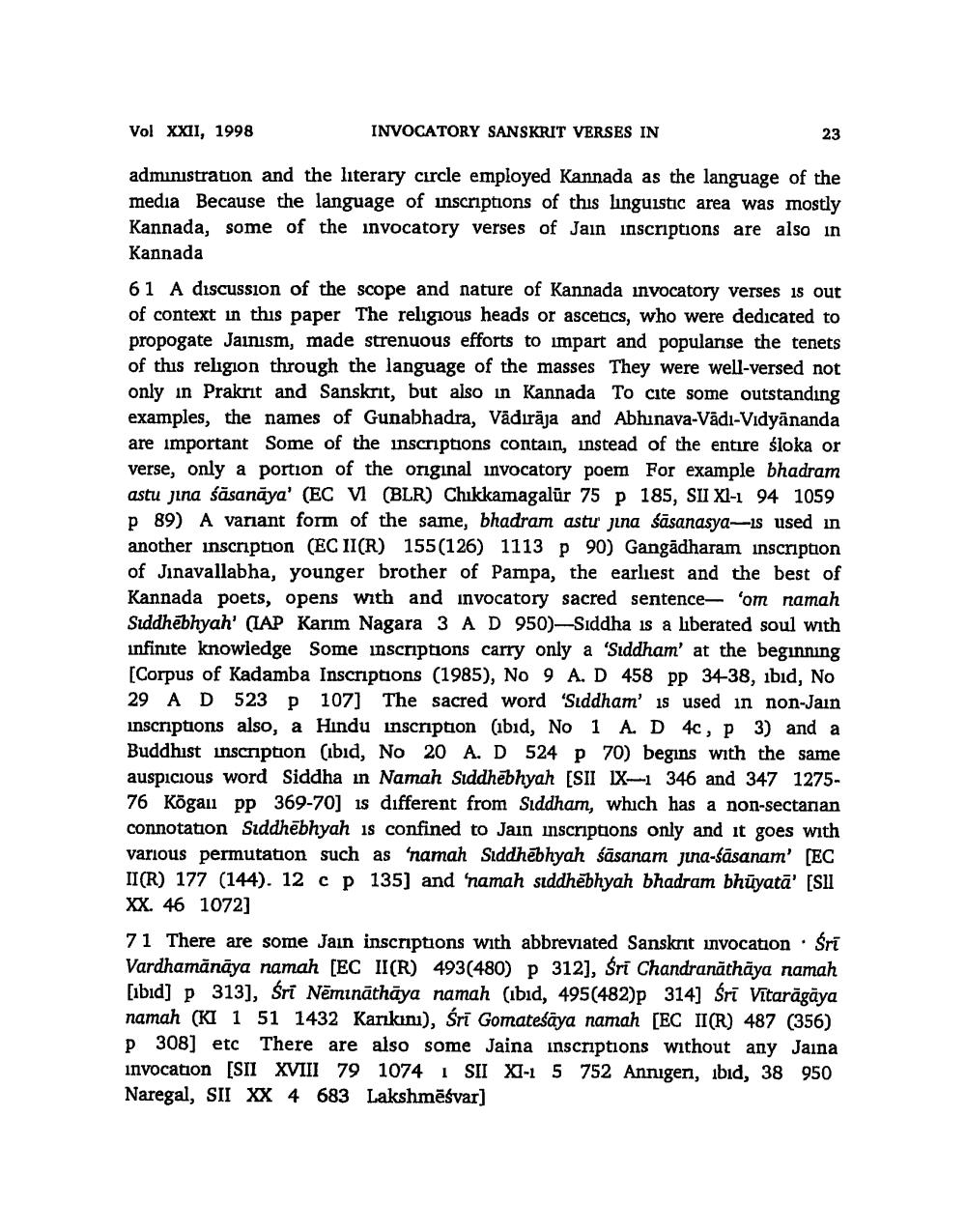________________
Vol XXII, 1998
INVOCATORY SANSKRIT VERSES IN
23
administration and the literary circle employed Kannada as the language of the media Because the language of inscriptions of this linguistic area was mostly Kannada, some of the invocatory verses of Jain inscriptions are also in Kannada 61 A discussion of the scope and nature of Kannada invocatory verses is out of context in this paper The religious heads or ascetics, who were dedicated to propogate Jainism, made strenuous efforts to impart and popularise the tenets of this religion through the language of the masses They were well-versed not only in Prakrit and Sanskrit, but also in Kannada To cite some outstanding examples, the names of Gunabhadra, Vādırāja and Abhinava-Vadı-Vidyānanda are important Some of the inscriptions contain, instead of the entire śloka or verse, only a portion of the original invocatory poem For example bhadram astu jina śāsanāya' (EC VI (BLR) Chikkamagalur 75 p 185, SII X1-1 94 1059 p 89) A variant form of the same, bhadram astu jina śāsanasya—Is used in another inscription (EC II(R) 155(126) 1113 p90) Gangadharam inscription of Jinavallabha, younger brother of Pampa, the earliest and the best of Kannada poets, opens with and invocatory sacred sentence- 'om namah Siddhēbhyah' (LAP Karim Nagara 3 A D 950)—Siddha is a liberated soul with infinite knowledge Some inscriptions carry only a 'Siddham' at the beginning [Corpus of Kadamba Inscriptions (1985), No 9 A. D 458 pp 34-38, ibid, No 29 A D 523 P 107] The sacred word 'Sıddham' is used in non-Jain inscriptions also, a Hindu inscription (ibid, No 1 A. D 40, p 3) and a Buddhist inscription (ibid, No 20 A. D 524 p 70) begins with the same auspicious word Siddha in Namah Suddhēbhyah (SII IX-1 346 and 347 127576 Kögan pp 369-70] is different from Siddham, which has a non-sectarian connotation Siddhēbhyah is confined to Jain inscriptions only and it goes with various permutation such as 'namah Siddh bhyah śāsanam jina-Sasanam' [EC II(R) 177 (144). 12 c p 135] and 'namah siddhebhyah bhadram bhūyatā' [SII XX. 46 1072] 71 There are some Jain inscriptions with abbreviated Sanskrit invocation • Śrī Vardhamānāya namah [EC II(R) 493(480) p 312], Sri Chandranāthāya namah [ıbıd) p 313], Sri Nēmınāthāya namah (ibid, 495(482)p 314] Sri Vītarāgāya namah (KI 1 51 1432 Karıkını), Sri Gomatesāya namah [EC II(R) 487 (356) P 308] etc There are also some Jaina inscriptions without any Jaina invocation [SII XVIII 79 1074 I SII XI-1 5 752 Annigen, ibid, 38 950 Naregal, SII XX 4 683 Lakshmēsvar)




